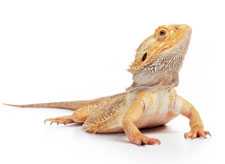Advice to Pet Reptile Owners
Multistate Outbreak of Human Salmonella Cotham and Salmonella Kisarawe Infections Linked to Contact with Pet Bearded Dragons (Final Update)
Posted August 20, 2014 11:15 AM ET
This investigation is over. However, reptiles continue to be an cause of human Salmonella infections in the United States. More information about Salmonella from reptiles and the steps people can take to reduce their risk of infection is available.

A bearded dragon, a type of lizard.
Contact with reptiles can be a source of human Salmonella infections. Reptiles can be carrying Salmonella bacteria but appear healthy and clean and show no signs of illness. Therefore, you should always follow these recommendations for protecting yourself and others, especially children, from contact with Salmonella bacteria that reptiles may carry:
Wash your hands:
- Wash your hands for at least 20 seconds with soap and water right after touching reptiles or anything in the area where they live and roam, including after handling reptile food.
- If soap and water are not readily available, use hand sanitizer until you are able to wash your hands thoroughly with soap and water.
- Handwashing is especially important before preparing, serving or eating food, drinks, or preparing baby bottles.
- Adults should supervise young children when washing hands.
Practice safe handling of reptiles:
- Do not let reptiles in areas where food or drink is prepared, served, or stored, such as kitchens and outdoor patios.
- Do not let reptiles roam freely throughout the house.
- Do not touch your mouth after handling reptiles or eat or drink around them.
Clean up properly when handling reptiles:
- Do not bathe reptiles in the kitchen sink or in bathroom sinks or bathtubs. Reptiles should be bathed in a tub or bin that is dedicated for reptile use only.
- Clean any equipment or materials used for caring for reptiles outside the house, such as tanks, feed or water containers, or items used for bathing.
- Use soap or a disinfectant to thoroughly clean any surfaces that have been in contact with reptiles.
Be careful with children and reptiles:
- Children younger than 5 years old, older adults, or people with weakened immune systems should not handle or touch reptiles, or anything in the area where they live and roam.
- Young children are at higher risk for serious illness because their immune systems are still developing and because they are more likely than others to put their fingers or other items into their mouths.
- Households with pregnant women should not adopt a pet reptile because infants and young children are at higher risk for serious illness.
- Do not keep reptiles in child care centers, nursery schools, or other facilities with children younger than 5 years old.
Persons who think they might have become ill from contact with reptiles should consult their health care providers.
More information is available in English and en Español.
Advice to Pet Store Owners and Others Who Sell or Display Reptiles
- Pet stores, street vendors, and others who sell or display reptiles should provide health-related information to owners and potential purchasers of reptiles near the reptile display area prior to the point of purchase, not at the cash register.
- This should include information about the risk of acquiring a Salmonella infection from reptiles and instructions for proper cleaning of the reptile habitat.
- Posters containing this information are available in English, Spanish, French, and Chinese.
- More information on displaying animals in public settings can be found in the 2013 Compendium of Measures to Prevent Diseases Associated with Animals in Public Settings [PDF – 19 pages].
Advice to Health Care Providers
- Health care providers should question patients about pet and animal ownership and should provide education about the risks of acquiring salmonellosis from reptiles.
- Health care providers should advise patients on proper hand washing practices.
Advice to Veterinarians
- Veterinarians should provide education to reptile owners about the risks of acquiring salmonellosis from these animals.
- Veterinarians should provide education to reptile owners on how to properly clean the animal habitat.
- Page last reviewed: August 20, 2014
- Page last updated: August 20, 2014
- Content Source:


 ShareCompartir
ShareCompartir